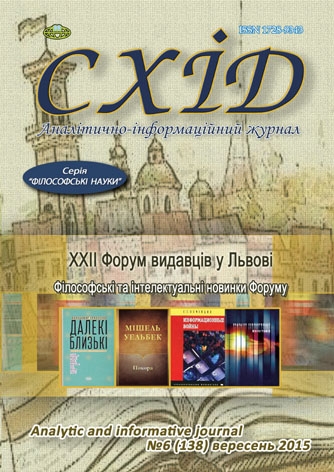Historographical reconstruction of implicit mediations between philosophical projects of Heidegger and Adorno
DOI:
https://doi.org/10.21847/1728-9343.2015.6(138).51609Keywords:
philosophical historiography, mediation, discourse, reconstruction, metaphysics, ontologyAbstract
Heidegger and Adorno are thinkers one can hardly imagine compatible. Nevertheless, it took the world philosophical community less than fifty years to produce a whole corpus of texts dealing with Adorno-Heidegger dispute. Although no evidence ever suggested that such a dispute really took place, Adorno's violent critique of Heidegger's jargon draws attention of both devoted Heideggerians and their not less devoted opponents and generates the real dispute over Adorno-Heidegger dispute. Unfortunately, Ukrainian scholars are of little concern about such secondary phenomena of the world philosophical process as reception history or reconstruction of the divides and bridges between leading figures in philosophy of the twentieth century.
The common ground for Heidegger and Adorno can be seen only through the lens of the deeper divide between analytical and continental traditions in philosophy. Post-Soviet condition of philosophizing can be changed if it finds itself within this continental coordinates as opposed to positivist ideology of science. This is where the implicit common core for contemporary Ukrainian postmarxism, Adorno's critical theory and Heidegger's fundamental ontology can be found. In this article I argue for historiographical turn in contemporary Ukrainian history of philosophy, which would enable overcoming of topical approaches in favor of influence approaches.References
Macdonald I., Ziarek K. (ed). (2008), Adorno and Heidegger: philosophical questions, Stanford University Press, Stanford, 222 p. (engl).
Buck-Morss S. (1977), The Origin of Negative Dialectics, The Free Press, New York, 350 p. (engl).
Garlitz D. (2010), FrankfurtSchoolcontra Heidegger: Adorno's Cultural Critique of the Ideology of German Existentialism, in The Jargon of Authenticity, available at: http://www.philosophyofculture.org/Adorno_contra_Heidegger_The_Jargon_of_Authenticity _Garlitz_2010_5.pdf (engl).
Jay M. (2010), Taking on the Stigma of In authenticity: Adorno's Critique of Genuineness, In: Language without Soil: Adorno and the Late Philosophical Modernity, Fordham University Press, New York, pp. 17-29 (engl). doi: 10.5422/fso/9780823231263.003.0003
Philips W. (2015), Metaphysics and music in Adorno and Heidegger, Palgrave Macmillan, Basingstoke, 229 p. (engl) doi: 10.1057/9781137487254
Rayman J. W. (2004), A Heideggerian Defence of Phenomenology against Adorno's Negative Dialectical Critique, In: Does the world exist? Plurisignificant ciphering of reality, Kluwer Academic Publishers, Dordrecht, pp. 637-648 (engl). doi: 10.1007/978-94-010-0047-5_39
Huhn Th., ed. (2004), The Cambridge companion to Adorno, Cambridge University Press, New York, 440 p. (engl). doi: 10.1017/CCOL0521772893
Adorno T. (2003), Negative Dialectics, Nauchnyi Mir, Moscow, 374 p. (rus).
Adorno T. (2011), The Jargon of Authenticity, Canon+, Moscow, 191 p. (rus).
Karpenko A. (2014), Heidegger and Adorno: prolegomena to reconstruction of the dialogue which never happened, Skhid, № 2 (128), pp. 141-144 (ukr).
Krechetova M. (2011), The Question of authenticity: Th. Adorno versus M. Heidegger, Vestnik of Tomsk State University. Philosophy. Sociology. Politology, 2 (14), pp. 122-129 (rus).
Stepin A. Svideteli Nichto (Adorno i Heidegger) [Witnesses of Nothingness (Adorno and Heidegger)], Conference "Lomonosov 2012", available at: http://lomonosov-msu.ru/archive/Lomonosov_2012/1912/12650_3caf.pdf (rus).
Downloads
Published
How to Cite
Issue
Section
License
Copyright (c) 2015 Andriy Karpenko

This work is licensed under a Creative Commons Attribution-NonCommercial-NoDerivatives 4.0 International License.
1. Authors bear responsibility for the accuracy of facts, quotations, numbers and names used.
2. Manuscripts are not sent back.
3. The publisher does not always agree with the authors' opinion.
4. The authors reserve the right to authorship of the work and pass the first publication right of this work to the journal under the terms of a Creative Commons Attribution Non-Commercial License, which allows others to freely distribute the published research with the obligatory reference to the authors of the original work and the first publication of the work in this journal.
5. The authors have the right to conclude separate supplement agreements that relate to non-exclusive work distribution in the form in which it has been published by the journal (for example, to upload the work to the online storage of the journal or publish it as part of a monograph), provided that the reference to the first publication of the work in this journal is included.

